The Face of Another Read online
Page 2
Suddenly, I ripped the book in two. And with it my heart. From the tear my insides came running out like a rotten egg. I became an empty, cast-off skin. Piling the torn pages together, I regretfully handed them back to the girl. But it was too late. The thermostat of the isothermic tank, which in normal circumstances was inaudible, made a tremendous noise like the bending of a zinc plate. The girl’s knees knocked together with such force under her skirt that they might well have fused.
IT SEEMED that I could not yet really comprehend the meaning behind my confusion at that time. I was so ashamed I writhed in anguish, still I did not rightly grasp what I had to be ashamed about. No, if I had tried I might have been able to understand, but perhaps I was taking refuge in what is commonly called “childish behavior,” instinctively avoiding a deeper search. I can hardly believe that the face is so important to a man’s existence. A man’s worth should be gauged by the content of his work; possibly the convolutions of the surface of the brain have something to do with it, but his face certainly does not. If the loss of a face can cause conspicuous change in the scale of evaluation, it may well be owing to a fundamental emptiness of content.
But soon afterwards—several days after the incident of the picture—I was forced to realize to my dismay that the relative importance of a face far exceeds such wishful thinking. The warning came from the inside, stealthily. Absorbed in my defences against the outside, I was taken by surprise and easily overcome. The attack was so sharp and sudden that even while I was being overcome I was unable to grasp it at once.
That evening when I returned home I had an unusual longing to listen to Bach. It did not have to be Bach necessarily, but in my hangnail, wound-up mood, I wanted no jazz, no Mozart—Bach was indeed the most appropriate. I have never been a connoisseur of music, but perhaps I use it well. Sometimes, when my work was not making much headway, I chose music in keeping with my needs. If I chose to interrupt my thinking for a while there was piquant jazz; when I wanted impetus for a spurt there was the speculative Bartok; if I desired a feeling of freedom, there was the Beethoven of the quartets; when I wished to concentrate on a point, there were the spiral movements of Mozart; and then, Bach. He was the best for times when I needed spiritual balance.
But, for a moment, I suspected I had mistaken the record. If not, certainly the machine was out of kilter. The music sounded insane. I had never heard such Bach. If you suppose Bach to be balm for the soul, imagine it as nothing but a lump of clay, neither poison nor balm. It was meaningless and stupid; every phrase played seemed to me quite like a dusty, sticky lollipop.
At precisely that moment you filled two cups with black tea and brought them into the room. When I said nothing, you must have thought I was absorbed in my listening, and you left, keeping your footsteps as quiet as possible. Then, it appeared that I was the one who was mad! Even so, I could not believe it. How should a wound on the face have any effect on one’s sense of hearing? But the deformed Bach, no matter how I listened, would not go back to normal again; I could only assume the wound had produced this effect. I stuck a cigarette through the slit in the bandage and asked myself with a nervous fidget what I had lost along with my face. Apparently my philosophy about faces stood in need of fundamental revision.
Then, suddenly, as if the floor of time had slipped away, I found myself in a memory of thirty years ago. The event I had thought of not even once since then abruptly and vividly came back. It concerned my elder sister’s false hair. I don’t quite know how to put it, but I felt the wig to be unspeakably indecent and immoral. One time I sneaked it away and burned it up. My mother discovered this. She was strangely insistent. She questioned me, and although my action had been intended to do right, when it came to being examined I did not know what to answer and just stammered and blushed. No, if I had tried perhaps I might have been able to answer. But such things are sullied by being spoken aloud; I think my very strict moral sense made me be silent.… And if I replaced false hair with the word face the same unbearable feeling of frustration would fit in perfectly with the crumbling and empty sounds of the Bach.
When I stopped the record and came out of the study, as if impelled, you were just in the act of polishing some glasses lined up before you in the dining room. I cannot trace back what happened to me. But coming up against your resistance, I was at last able to grasp the meaning of my own position. I bore down on your shoulder with my right hand and tried to thrust my left hand up under your skirt. You gave a shriek and, suddenly straightening your legs, jumped up. The chair fell over and a glass crashed to the floor.
We stood transfixed, breathless, with the fallen chair between us. Admittedly my action must have been too headstrong. But I also had some excuse. It was a desperate effort to regain all at once what I was beginning to lose because of my ravaged face. Since the accident, the two of us had completely stopped sexual relations. In theory, I conceded that my face was an incidental reason, but in reality perhaps I was sneaking around trying a direct test of your response. I had been driven into a corner, and there was nothing to do but launch a frontal counterattack. Apparently I had tried to convince you by my action that the face was a mere screen, an illusion of no importance.
The feel of your inner thigh still glowed like powdered alabaster on my finger tips. A cry stuck in my throat like a bundle of thorns. How much I wanted to say … but I could not form a single word. Excuses? Consolation? Blame? If we had talked about it, we would have had to decide on one or the other, and such a decision would hardly have been enough. If it were a question of excuses and consolation, I would have preferred to melt away like smoke. Supposing I chose to attack.… Well, if I tore your face off, at least you would be the same as I … or some even more horrible goblin. Suddenly you began to sob. It was an unnerving sound, like air escaping from a faucet when the water stops.
Suddenly, a deep hole popped open in my face. It seemed gouged out so deep that with my whole body in it there would still have been more room. A liquid, like pus from a decayed tooth, dribbled down. Terrific stenches in the room, catching the sound, came swarming out like cockroaches—from inside the chair, from the corner of the cabinet, from the drain of the sink, from the lampshade discolored with the dead bodies of insects. I wanted a stopper for the hole in my face—anything would do. How I longed to put an end to this anguish, this game of blindman’s buff with no blindman.
IT WAS a mere hair’s breadth from this point to making plans for a mask. Basically, the idea was not at all extraordinary; like some windblown seed, it needed only a speck of ground and a drop of water to grow. And so the next day, without much enthusiasm or seriousness, as if the whole thing had been predetermined, I began looking through the indices of old scientific journals. It must have been the year before last, sometime in the summer, that there had been an article on artificial organs made of plastic. I would cover up the holes in my face with a plastic mask. Of course, according to one theory a mask is apparently the expression of an extremely metaphysical aspiration to give oneself a kind of transcendental disguise, for the mask is not simply something compensatory. Even I did not regard it as anything like a shirt or a pair of pants that I could change at will. However, I really don’t know about the ancients, who believed in idols, and about adolescents who imitate them, but for me, at this point it is probably useless to decorate the altars of my next life with masks. No matter how many faces I have, there is no changing the fact that I am me. I was just attempting to fill in a too-long intermission in my life with a trivial “masked play.”
I soon found the periodical I was looking for. According to the literature, it was apparently possible to construct a mask that would simulate real skin, at least outwardly. But there were a number of unresolved points such as mobility. If I were somehow to make it, most certainly I had to achieve expression, presumably by linking the mask to the muscles governing expression. I wanted something that could expand and contract freely, something that could laugh and cry. Even supposing the proje
ct were feasible at the present-day level of high-molecular chemistry, it did not seem within reach of a mere amateur’s capacities. Yet at that time the mere possibility of the venture was a wonderful tranquilizer for me. If I could not have the tooth taken care of, I could at least take a temporary pain-killer.
At once, I decided to look up Doctor K, the author of the article on artificial organs, to hear what he had to say.
K’s response on the telephone, however, was extremely rude; he seemed unenthusiastic, to say the least. Perhaps he felt some resentment at my being engaged in the same high-molecular work as he, But he agreed to see me, some time after four.
I handed over the switch inspection to the man in charge of the overtime shift, and when I had disposed of two or three remaining chits, I immediately left. The street was as bright as if it had been polished, and the breeze was laden with the scent of fragrant olive. I was unreasonably jealous of the smell and the light. As I waited for a taxi, I had the impression of being stared at from all sides, as if I were some interloper. All this was merely a negative image, with black and white reversed, and I stoically bore the too brilliant sunlight, thinking that if I could just get my hands on a mask, I should at once be able to recover the positive.
The building I went to was situated on a residential street somewhat difficult of access, near a station on the inner belt of the transit system. A rather unimposing sign, K’s High-Molecular Chemistry Institute, hung outside the commonplace house. Just inside the gateway stood three rabbit hutches carelessly piled on top of each other.
In the narrow waiting room, along with an ashtray stand and a shabby wooden bench, lay a number of old magazines. Vaguely, I began to regret having come. Institute sounded respectable enough, but this was the kind of setup some neighborhood practitioner might choose. I wondered if K weren’t merely some quack who was taking advantage of the uncertainty of his patients. As I looked around, I saw two photographs in slightly dirty frames decorating the walls. One showed a side view of a girl’s face. She looked like a chinless field mouse. The other, doubtless after plastic surgery, showed a much better face over which hovered a faint smile.
My accumulated sleeplessness, turned into a heavy stiffness, began to spread to my forehead. The hard bench was beginning to make me restless, when finally the nurse showed me into the next room. The light filtering through the blinds lay in white, milk-like pools. On the table by the window a variety of unusual instruments, like hypodermic equipment, was menacingly laid out; beside the table stood a cabinet for medical charts and a swivel chair with arms; opposite was a waist-high dressing cubicle on rollers and a single-paneled screen with a metal frame—standard accouterments that made me feel increasingly disconsolate.
I lit a cigarette. As I arose to find an ashtray, I was suddenly startled by the contents of an enameled tray on the table. An ear, three fingers, an arm, and the side of a cheek from the eyelids to the lips lay there, casually arranged, with a freshness that bespoke their recent removal. I felt nauseous. They looked more real than genuine organs. I would never have supposed a replica could produce such a brutal impression. Although I could see the cut edges, and knew that the objects were unmistakably nothing more than molded plactic, I had the illusion that I could smell the stench of dead flesh.
Suddenly K appeared from behind the screen. I heaved a sigh of relief at his surprisingly mild appearance. Frizzy hair, thick, rimless spectacles like the bottom of tumblers, fleshy jowls.… A medicinal odor to which I was long accustomed gave me a feeling of intimacy with him.
Now it was his turn to be flustered. He studied my face with an expression of amazement, my card in his hand, and for a while said nothing.
“Well, then.… You …,” he stammered, glancing again at the card. His tone was considerably more temperate than the one he had used on the telephone. “Have you come as a patient?”
How was I to answer him? No matter how good K’s technique was supposed to be, he could not possibly satisfy my ambitions. What I expected at most was his advice. But it was not my intention to hurt him by saying it to his face. K apparently took my silence for timidity and added sympathetically, “Please sit down.… What seems to be the trouble?”
“Well, you see … there was an explosion of liquid oxygen during an experiment I was performing. Perhaps because I was always accustomed to using liquid nitrogen—anyway, I was careless.…”
“Are they keloid scars?”
“On the whole face. I apparently have a predisposition to keloids. The doctor who diagnosed it fumbled and only irritated the scars, and there was a relapse; he just gave it up.”
“But it appears to be all right around the lips.”
Meanwhile I took off my sunglasses. “My eyes are intact too, thanks to my glasses. Perhaps it was fortunate I had to wear them for my myopia.…”
“That was lucky!” he exclaimed, as if it were he who was scarred. And then he added eagerly, “At least, you have your eyes and lips. If you couldn’t move them, it would be really bad. Camouflage would be worthless, no matter how much form you constructed.…”
K appeared enthusiastic about his work. He stared intently into my face, and in his mind he already seemed to be drawing a rough sketch. I suddenly changed the subject so as not to disappoint him.
“I read your article. It must have been last year, in the summer as I recall.…”
“That’s right. It was last year.”
“And you know, I was amazed. I hadn’t dreamed anything so elaborate could be done.”
K picked up a shriveled finger with apparent satisfaction, and as he gently let it fall on his palm said: “You’ve got to have perseverance in this work, you know. Don’t you think these fingerprints are quite the same as the real thing? They are so much so, actually, that the police department asked to register them.”
“Do you use plaster of Paris for making the mold?”
“No, I use a silicon paste. Because plaster of Paris always skips the details. Look, see how clearly even the cuticle of the nail comes out.”
I gingerly picked it up with the tips of my fingers; it had the soft feel of a living thing, and while I realized it was a fabrication, I had the weird sensation that it could infect me with—well, with death.
“It’s something of a profane feeling, isn’t it?”
“I expect a human body is.…” K triumphantly took up another finger and stood it vertically on the surface of the table, with the cut edge down. A dead man seemed to be thrusting his finger upward through the boards of the table. “The trick is to deliberately make them slightly dirty like this. If you went along with the patients’ ideas to prettify them, you would get something very strange. For example, this is a middle finger, so on the back side of the first joint, I tried applying this brownish spot. It looks a little like a tobacco stain, doesn’t it.”
“Do you put it on with a brush or something?”
“Not at all.…” For the first time, K laughed out loud. “If you painted it on, it would come right off, wouldn’t it? I build up different color elements from underneath. For example, for the nail, acetic acid vinyl … at the joints, the shadows of wrinkles … in places along the veins, a faint bluish green.”
“Isn’t this simply handicraft? Probably anyone could do it.”
“That’s true,” he said, jiggling his leg. “But such stuff as this is elementary compared to work on the face. Whatever you say, it’s the face that’s hardest. First of all, there’s the expression. As soon as you put on a bump or a wrinkle, even no more than a tenth of a millimeter, it takes on a profound meaning.”
“But you can’t make it move at all, I suppose, can you?”
“That’s expecting too much.” K spread his legs and directly faced me. “I’ve put all my efforts into making the outside of the face; I haven’t come to movement. Of course, you can partially make up for this deficiency by choosing an area where there’s little motion. But there’s another problem—ventilation. In your case, I wouldn
’t know until I looked, but judging from what I see, you are perspiring even through the bandage. The sweat glands must still be alive. Because with the sweat glands alive, you can’t cover the whole face with something that allows no ventilation. It’s not only physiologically bad, but it would be so stifling I doubt you could stand it even half a day. It’s best to be moderate about this kind of thing. An extreme change would be as laughable as an old man’s fitting himself up with baby teeth. Any modification that doesn’t call attention to itself is by far the most effective.… Can you take off the bandage yourself?”
“I can … but.…” Musing how best to tell him I was not a patient, as K seemed to think, I said: “To tell the truth, I’m in something of a fix, since I haven’t completely made up my mind. I suppose there’s no particular need at this point to be so fussy about my facial injury, to the extent of making such stopgap substitutes as these.”
“Indeed there is!” K spoke emphatically, as if to encourage me. “Injuries to the body, especially the face, are not treated simply as problems of form. We should rather speak of them as belonging in the province of mental hygiene. Otherwise, who would willingly devote his efforts to cosmetic work? As a doctor, I have my pride. I should never be satisfied to be only a craftsman making imitations.”
“Yes, I understand.”
“Do you, really?” he asked. “You’re the one who said my work was only on the level of handicraft.”
“I didn’t particularly mean it that way.”
“Don’t worry about it … please,” K rejoined with the generosity of an understanding schoolmaster. “When it comes right down to it, you’re not the only one who vacillates. No, it’s common enough to feel resistance to having one’s face manufactured. Perhaps, since modern times.… Even now, primitive men make false faces as a matter of course.… I’m unfortunately not enough of a specialist to understand why attitudes have changed. But there’s statistical proof. For example, if you consider exterior wounds, facial injuries are about one and a half times as numerous as injuries to the four extremities. And yet the number of people who request treatment for the loss of a limb or even a finger is eighty percent higher. There’s clearly some taboo about the face. On this point even doctors are in agreement. There are only a few opinionated men who treat my work as that of a high-class, money-grubbing beautician.”

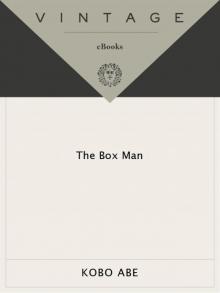 The Box Man
The Box Man Beasts Head for Home
Beasts Head for Home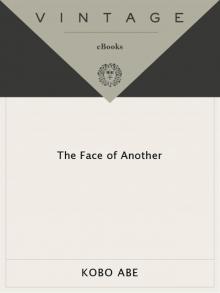 The Face of Another
The Face of Another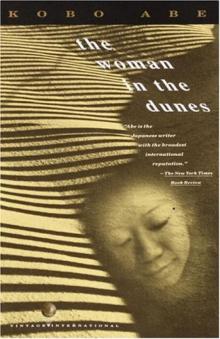 The Woman in the Dunes
The Woman in the Dunes Secret Rendezvous
Secret Rendezvous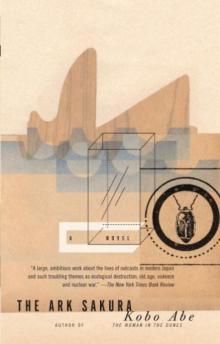 The Ark Sakura
The Ark Sakura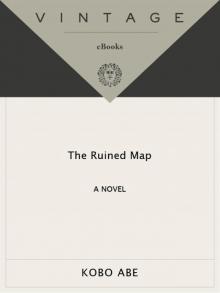 The Ruined Map
The Ruined Map